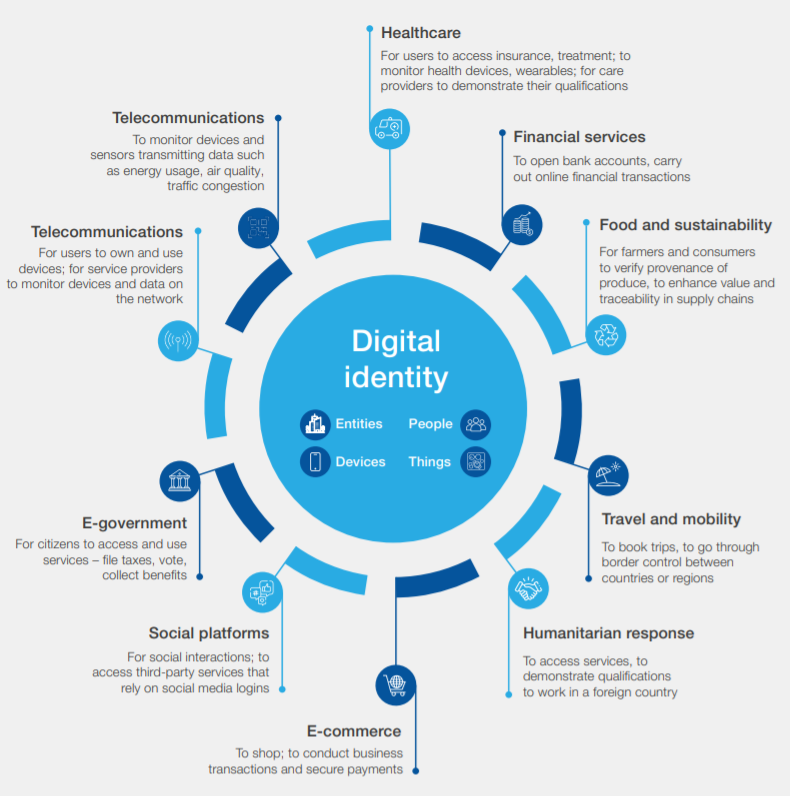The proposal comes just months after the European Parliament and the European Council of Ministers unanimously approved the European Commission’s sweeping digital identity regulations.
As readers have presumably guessed, the asterisked word in the title is not “wink”.
Spain’s Pedro Sánchez government recently unveiled plans to push the boundaries of Internet control by launching a digital age verification system to prevent minors from being able to access pornographic websites. A few days ago, the country’s Minister of Digital Transformation (an increasingly common government position), José Luis Escrivá announced that the system will be based on a digital wallet app that is currently in the beta phase of testing. In other words, the app is not quite ready yet but apparently will be by September.
Through said app, adult porn users will be able to obtain anonymous digital access credentials. And those credentials will soon be necessary to enter digital spaces hosting adult content. The whole process will be fairly simple, according to the Spanish newspaper ABC:
The user will only have to register their age through the Digital Wallet by using an official document, such as an electronic ID. They will then be able to generate an anonymous credential that will allow them to enter the porn website. When the Internet user tries to access it, the page in question will be able to check their age through this verification system by reading a QR code. If the user is of legal age and therefore has the access credential, they will be able to consume content; if not, entry will be blocked.
The access credentials will not reveal user data, but will simply confirm whether the user is an adult or a minor. Before imparting that information to any website, the software will verify that the platform in question is a “trusted” entity against a list compiled by the authorities — presumably in the vein of the Trusted News Initiative, but for porn providers.
Rationing Pornography for Adults
The digital wallet will not only close off access to porn websites to minors; it will also ration the number of times adult users can access pornography websites, reports WIRED magazine’s Spanish edition:
The Digital Wallet works as an electronic purse that offers the user a batch of 30 anonymous access credits that are generated within the (mobile) device and are valid for a maximum of 30 days. The system will automatically assign a maximum of three access keys to each pornography platform. “These are used randomly within the same provider a maximum of 10 times and never between several services. When the 30 credits have been used up, 10 for each of the three credentials, another subset of 3 credentials will be selected from the batch of 30,” explains the ministry. A new set of keys will be issued each month.
This is all apparently necessary to prevent government authorities or the companies subcontracted to manage the system from being able to trace users’ browsing habits. But according to remarks made by Escrivá, the 30-day validity period and the number of access keys granted during that time could change if deemed necessary. In other words, the government wants to grant itself the power to determine exactly how much pornography adults can consume on a monthly basis.
The government claims that these intrusive measures are needed in order to prevent minors from accessing sexual material online. It is a powerful pretext (we will discuss the government’s real motive later). Given the ubiquity and nature of online porn these days (yes, I have been a periodic user, though not for a number of years), with much of it violent and/or degrading, there is an argument to be made for restricting accessibility to impressionable minors, especially pre-teens.
“If we don’t all work together, this problem will be impossible to solve,” says Escrivá. During the presentation of the new digital wallet, the minister pointed out that “the vast majority of young people between 18 and 26 years of age see internet porn as a faithful representation of sexual intercourse.” He also stressed that the consumption of this kind of content shapes minors’ perception of sexual relations into adulthood, noting that the number of sexual assaults perpetrated by minors has more than doubled in the past five years.
The proposed digital identity wallet, which has already been dubbed on social media as “pajaporte” — an amalgam of the Spanish words “paja” (to jerk off or wank) and “pasaporte” — has been ridiculed in most quarters, including parts of the mainstream media. A column in El País by Daniel Gascon sarcastically asks: “what is the point of having a welfare state is if it can’t keep track of citizens’ masturbatory habits?” It also notes, again with what seems like a healthy helping of irony, that if there is one thing the proposal is guilty of, it is “a lack of ambition”:
(T)he ideal scenario would be for the Government to authorise the use of any application. This would allow it to better protect citizens, see what they read, what jokes and news they share. It is a matter of public health. But, in the meantime, this is a start.
This article, it seems, was written in jest. But it could be worryingly close to the truth. The Spanish government is already talking of requiring a similar digital identity wallet to access other online platforms. Carmen Cabanillas, director general of Governance at the Ministry of Digital Transformation, said that in the future the tool could be used by messaging applications, social networks or browsers to check the age of users, as well as presumably other things.
Such proposals are eerily reminiscent of some of the use cases (telecommunications, social platforms) depicted on the World Economic Forum’s now-infamous 2018 infographic on digital identity.

There are, of course, serious flaws in the government’s proposed “pajaporte”. For a start, the digital verification system will only be mandatory for adult content websites hosted in Spain. In other words, once the system is up and running (assuming it ever is), users, regardless of their age, will be able to continue accessing the vast majority of adult content sites on the Internet without any government hindrance. And if someone specifically wants to continue accessing Spanish-hosted porn, they could do so by simply using a VPN.
Presumably, there will be a plethora of other workarounds that (both adult and underage) porn users will be able to use to circumvent the proposed restrictions. As they say here in Spain, “hecha la ley, hecha la trampa,” which essentially means that once a law is approved, someone will find a way of getting around it. And this proposed law has more potential loopholes than a medieval castle. In other words, it is likely to have a limited impact on the amount of Internet porn consumed in Spain, whether by adults or minors.
The Real Motive
That said, the Spanish Government claims that other EU countries are working on similar measures, so that, over time, visiting adult websites without proof of age will become more and more difficult across the EU. The Sánchez government is also apparently considering making changes to Spain’s General Telecommunications Law that will essentially ban access to digital platforms that do not incorporate age verification mechanisms.
The real motive here, I believe, is not to protect children from the insidious effects of online porn; it is to begin the process of launching digital identity wallets for widespread public use. Spain’s Ministry for Digital Transformation insists its proposed digital identity wallet complies fully with the standards established in the European Regulation on Electronic Identification and Trust Services for Electronic Transactions (eIDAS2).
This is the part of the story that isn’t getting nearly the amount of attention it deserves in the Spanish media. But it is a story we have already covered in our article, Greece Just Gave a Glimpse of How the EU’s “Voluntary” Digital ID Wallet Will Gradually Become Mandatory:
Unbeknown to most EU citizens, digital identity is now a legal reality across the 27-nation bloc. On February 28, the European Parliament gave its final approval to the European Commission’s Digital Identity Regulation with a comfortable majority of 335 votes to 190, with 31 abstentions. The EU Council of Ministers gave its blessing on March 26. According to the Commission, the next step will be its publication in the Official Journal and its entry into force 20 days later, which by my calculations will be in just three days’ time.
The EU regulation obliges all member states to make a digital identity wallet available to every citizen who wants one. That is how the new system is currently being marketed — as an optional extra for citizens who want to avail of its many benefits. The wallet can be used to store people’s surnames, first names, dates and place of birth, gender, or nationality as well as enable Europeans to identify themselves online. Its touted benefits include making it easier to access public and private-sector services across EU borders, helping to streamline bureaucracy and reduce the risks of digital fraud and other forms of cyber crime.
This, one might think, would be a big news story given the potential of digital identity to transform, for better or worse (my money’s certainly on the latter), myriad aspects of EU citizens’ lives. Yet it has been met by a wall of silence in both the mainstream and social media.
Instead, what we are likely to see in the months ahead is a sudden explosion of Trojan Horse initiatives aimed at instilling the need for digital identity wallets for a host of common everyday activities or services, whether accessing porn websites or, as in India, receiving State benefits. As with the vaccine certificate, the goal is to achieve as broad an uptake in as short a time as possible. The government of Greece recently provided a hint of how that might be achieved: by making access to certain public services and spaces — in this case, sports stadiums — contingent on possession of a digital ID wallet.
Another (presumably intended) result of this is that it forces people, regardless of age or capability, to carry a smartphone app in order to access sport events. From the Greek government’s official ticketing website (machine translated):
We Are Returning to the Pitches Digitally and Safely!
From April 9, 2024, the Gov.gr Wallet, the Digital Wallet we have on our mobile phone, will be the necessary “tool” for every sports fan who wants to follow his favorite team. The way fans enter stadiums and stadiums throughout the country will now be done through the Gov.gr Wallet…
Based on the Joint Ministerial Decision of the Deputy Minister of Sports Yiannis Vroutsis and the Minister of Digital Governance Dimitris Papastergiou, the new way of entering the stadiums with the Gov.gr Wallet ticket will come into effect from April 9, 2024.
However, at the request of Sports Associations and Clubs, in order to be properly prepared and to give the necessary adaptation time to the fans, it will be possible to enter the stadiums, both in the way that was done prior to April 9, as well as with the ticket in Gov.gr Wallet, until the end of the current season.
Of course, this policy directly contradicts the Commission’s repeated assurances that the digital identity wallet is purely optional and that EU citizens will not face exclusion or discrimination for not using one. Yet as I document in my book, Scanned, digital identity is all about exclusion. The roughly 100 million Indian citizens that do not have the government-sanctioned Aadhaar number are excluded from government welfare programs as well as a host of other basic services.
Speaking at an event this week on “Governing in the Age of AI”, organised by his own TBI foundation, Tony Blair, one of the world’s most vocal advocates of digital surveillance and control technologies, described Digital ID as “an essential part of a modern digital infrastructure.” He then added, to peals of laughter from the audience, that “we will have a little work of persuasion to do here.”
Tony Blair on “Digital ID is an essential part of a modern digital infrastructure (…) Although, we have a little work of persuasion to do here!” https://t.co/XXGXivHnXv pic.twitter.com/SQ2JwqqexM
— Tim Hinchliffe (@TimHinchliffe) July 9, 2024
Of course, the word Blair was actually thinking of here (but didn’t say, for obvious reasons) is “coercion,” not persuasion, since “persuasion” suggests that the people receiving the message will have a choice about whether or not to act on it. That will not be the case here, for the simple reason that the mass roll out of digital identity in ostensibly liberal democracies can only by achieved by coercing, or (in the vernacular of today’s governing classes) “nudging”, people into grudgingly accepting something that many of them instinctively recoil from.
Lastly, there will inevitably be those who say that if you’ve got nothing to hide, you’ve got nothing to worry about — a farcical argument that is unlikely to convince the untold millions of Spanish adult users of online porn. But even those who cling to the notion that they have absolutely nothing to hide from government authorities still have something to worry about regarding the government’s digital identity plans: the security of their most personal data, including their biometric identifiers.
Put simply, the government and the corporations they will subcontract out to cannot be trusted to keep all of this additional data safe. In recent weeks, Spain’s Directorate General of Traffic (DGT), which, among other things, handles the processing of driving licenses, was the victim of a data breach that resulted in the personal and vehicle information of more than 34 million drivers — equating to roughly three out of four Spanish citizens — being put up for sale online. Welcome to the Internet of compromised things, where just about everything is hackable!







